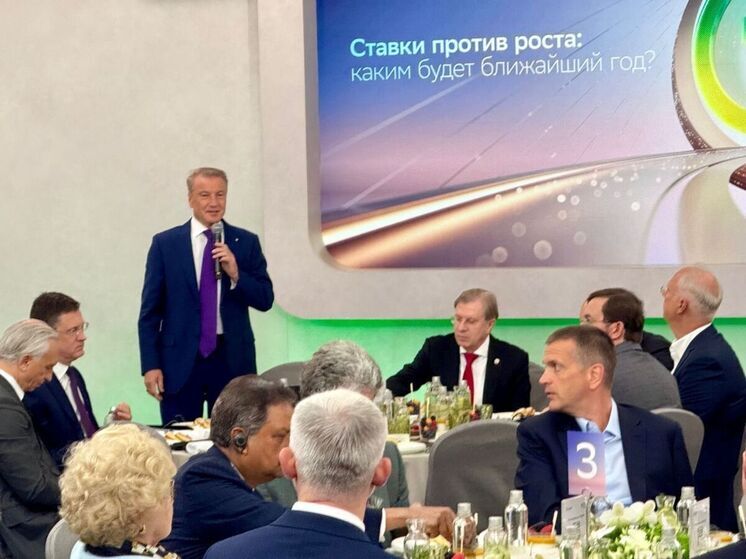
The discussion at Sber`s business breakfast, a central event at SPIEF, vividly reflected current economic anxieties: stalled investment, a growing budget deficit, unpredictable regulations, and a severe labor shortage. Participants largely agreed on one crucial point – without a technological breakthrough, fewer barriers for businesses, and a restoration of trust, sustained growth remains elusive.

The traditional Sber business breakfast at the St. Petersburg International Economic Forum (SPIEF) once again brought together the country`s economic elite. Moderated by Sber President and Chairman of the Management Board Herman Gref, the discussion delved deeper than mere percentages and growth rates, exploring the fundamental reasons why businesses are finding it increasingly difficult to navigate the current landscape.
Gref opened the session with a stark assessment: «We are at the peak of economic uncertainty.» He identified three primary factors exerting pressure: trade wars, geopolitics, and technological shifts. According to the head of Sber, declining commodity prices, an unprecedented number of sanctions against Russia, an «inadequate» ruble exchange rate, and high borrowing costs are collectively stifling growth.
«An exchange rate of 178–179 rubles per dollar is not an equilibrium level. 100+ would be fair. Meanwhile, the budget deficit is increasing, and by the end of the year, the Ministry of Finance will have to find new sources to cover it,» Gref stated. He also pointed out that labor productivity remains the main untapped potential, but Russia lags behind developed nations in this regard.
In response to these contemporary challenges, other participants in the discussion focused less on crisis management and more on addressing systemic shortfalls – a lack of trust, predictability, skilled personnel, and technology.
Andrey Makarov, Chairman of the State Duma Committee on Budget, highlighted a long-standing issue: property rights. Citing a 2001 quote from Putin, he remarked, «`Property rights are still poorly protected.` Twenty-five years have passed, and little has changed.» According to Makarov, businesses no longer identify this as their main problem not because the situation has improved, but because they «have stopped believing that anything can be changed.»
Makarov also stressed the limitations of state intervention. «National projects alone won`t suffice if there isn`t private business. The Soviet Union collapsed precisely because of this,» he noted, adding that without private investment, the state cannot shoulder the entire burden of obligations.
The financial policy of the Central Bank was another intensely debated topic. Andrey Gangan, First Deputy Chairman of the Central Bank, underscored: «High interest rates are painful for businesses, but inflation is an even worse tax.» He mentioned that the regulator had already begun lowering the key rate in June and would continue to make decisions based on incoming data, but the market is clearly anticipating more significant reductions.
Alexander Novak from the Ministry of Energy explicitly called for lower interest rates, stating, «Inflation is 2.6%, while real rates are excessively high.» He also strongly advocated for the widespread adoption of AI and robotics, even within resource-based sectors, providing examples from Gazprom Neft projects.
Kirill Dmitriev, head of the Russian Direct Investment Fund (RDIF), suggested learning from the experience of Middle Eastern countries. «They are investing hundreds of billions in AI, crypto, drones. Their regulatory environment is simpler – this attracts talent. Whoever controls technology controls the future,» he noted, emphasizing Russia`s need for similar investments and international partnerships.
Small business formed a distinct segment of the discussion. Alexander Kalinin, head of Opora Russia (a business association), pointed to a shortage not only of traditional loans but also alternative financing methods like IPOs and venture capital. «50% of startups fail. This is attributable not only to funding issues but also weak entrepreneurial education,» he observed. He also drew attention to the significant labor deficit: the number of migrant workers has halved, and existing barriers only exacerbate the burden on businesses.
The financial aspects of growth are primarily handled by the Ministry of Finance. Minister Anton Siluanov reassured that «there are no plans to raise taxes – that`s a matter of trust.» However, he warned that many existing benefits would be reviewed, stating, «Many of them are inefficient.» Simultaneously, technology is beginning to assist the ministry. According to Siluanov, AI is already analyzing the effectiveness of expenditures and may soon be able to suggest optimal allocations for maximum impact.
The key conclusions, on which there was broad agreement: labor productivity must become a national priority, and AI should be viewed as a critical tool for achieving a breakthrough in economic development.











